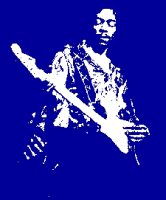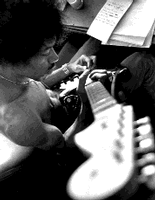





|
|
|
|
|
|
|
biography

Click for music
James Marshall Hendrix was born November 27, 1942, in Seattle, Washington. Jimi was raised by
his father after his parents were divorced while
he was still a young child. Noticing his son's
increasing infatuation in his classic jazz and
blues records, Jimi's father bought him a cheap
guitar. Very soon after, Jimi was playing with a
variety of local bands.
In May of 1961, Jimi joined the U.S. Army as a paratrooper. He made quite a few successful jumps, but the following year he was injured and given an honorable discharge.
After the army, Jimi returned to music. He bacame a sideman guitarist for many of the bands touring what was known as the "chitlin circuit," and spent the early Sixties playing behind Little Richard, The Isley Brothers, and Sam Cooke. Tired of being told what he could and couldn't play, Jimi soon became frustrated with his career and decided to strike out on his own.
Hendrix found himself in New York's Greenwich Village, playing with his band Jimmy James and the Blue Flames, where he was discovered by Chas Chandler, former bassist with The Animals. Chas, banking on his newfound discovery, swept Jimi off to London to orchestrate and guide Jimi to stardom. Chas' first moves were changing the spelling of Hendrix's first name from Jimmy to Jimi (thinking it would be more memorable) and arranging a jam with the British band Cream. This was all that was needed to get a buzz started.
A three-piece format was settled on, auditions
were quickly set up, and Noel Redding and Mitch
Mitchell were chosen to play bass and drums,
respectively. The band was named The Jimi
Hendrix Experience and was soon recording and
releasing its first singles. The first
full-length album, Are You Experienced?,
was soon to follow and spent the summer of 1967 at number two on the charts (behind the Beatles'
Sergeant Pepper's Lonely Hearts Club
Band).
One highlight of that "Summer of Love" was Jimi's introduction to the American audience at the
Monterey Pop Festival. Jimi closed the show and
stunned the crowd by torching and then smashing
his guitar during his version of Wild Thing.
Hendrix was suddenly a superstar.
The band played countless shows that year and on December 1st released a new album entitled Axis: Bold As Love. This new album demonstrated Jimi's growing love for experimentation, not to mention his songwriting and production prowess.
October 1968 saw the release of Electric Ladyland, a landmark album of sonic landscapes and tales of the cosmos, some of which was recorded at Electric Ladyland, Jimi's new recording studio and musical playground.
Around this time, internal friction and stress led to the breakup of The Experience. When Hendrix played the Woodstock Music and Art Fair in August 1969, he had an all new six-piece band. This, of course, is when the classic performance of The Star Spangled Banner occurred. Delivered during the height of the Vietnam war and civil rights unrest, it is truly one of the most inspired guitar performances in history.
The close of 1969 saw Hendrix with a new all-black trio called The Band of Gypsys, with which he played four shows during the New Year's holidays in New York. These concerts were released as an album in 1970. Jimi soon began work on his next album, which was to be called First Ray of the New Rising Sun, and, in August 1970, played the Isle of Wight Festival.
On the evening of September 17, 1970, Jimi wanted to get some rest before an upcoming trip to America. He took some sleeping pills and went to bed. The following morning, Jimi's girlfriend tried to wake him but, having no success, decided to try again later. After a while, when she was still unable to wake Hendrix, she became concerned and called an ambulance. It is reported that when help arrived, Jimi was unconcious but still alive. But when he arived at the London hospital, he was pronounced dead, having choked on his own vomit. Jimi Hendrix was 27 years old.
Hendrix's impact on guitar playing and rock music in general is immeasurable. He definitely changed the way music is made and the way all guitarists
approach the instrument. Whether you realize it or not, Jimi has in some way affected the way you listen to and play music. His breakthroughs in guitar style, his pioneering use of effects and feedback, and his experiments in recording and production techniques all have had a huge influence on today's new music. Hendrix will remain influential for years to come.
It is quite unimaginable that, although Jimi's career lasted only four short years (1966 - 1970), he was able to amass such a large body of work. Recently, the Hendrix family has unearthed a staggering amount of previously unreleased material. It is questionable whether or not all of this should be released -- there is probably a reason a lot of this music hasn't been heard. On the other hand, it sure is nice to hear something totally new every once in a while.
Wait and see...
JAMES MARSHALL HENDRIX
1942 - 1970
the official Jimi Hendrix web site at:
www.jimi-hendrix.com.
For a complete list of
Jimi Hendrix albums and merchandise,
visit
Sign Guestbook
home | bio | discs | pics | links
The Jimi Counter says
(all text) Copyright © 1999 Metropolis Productions